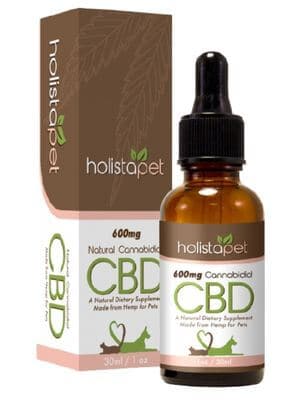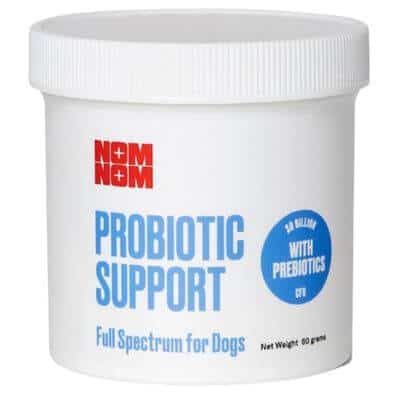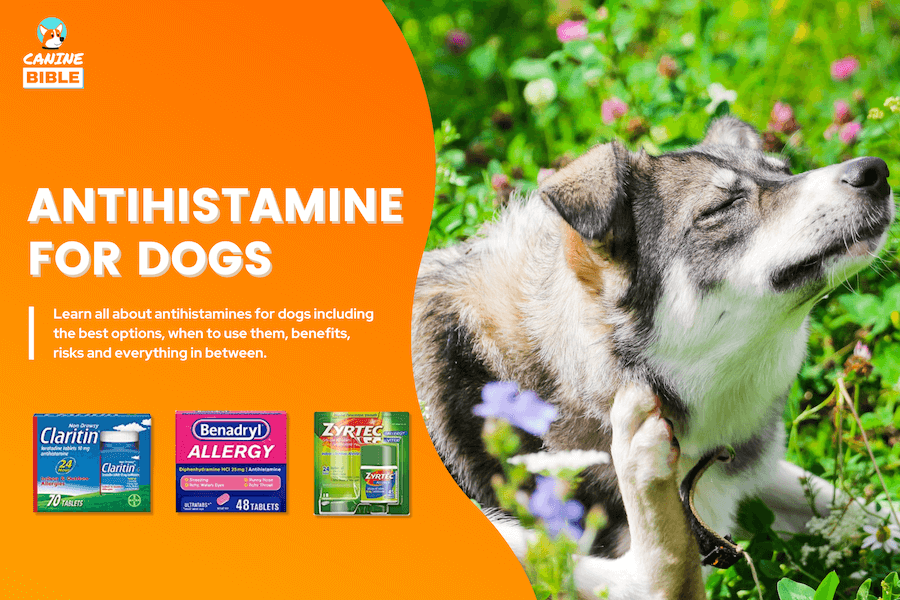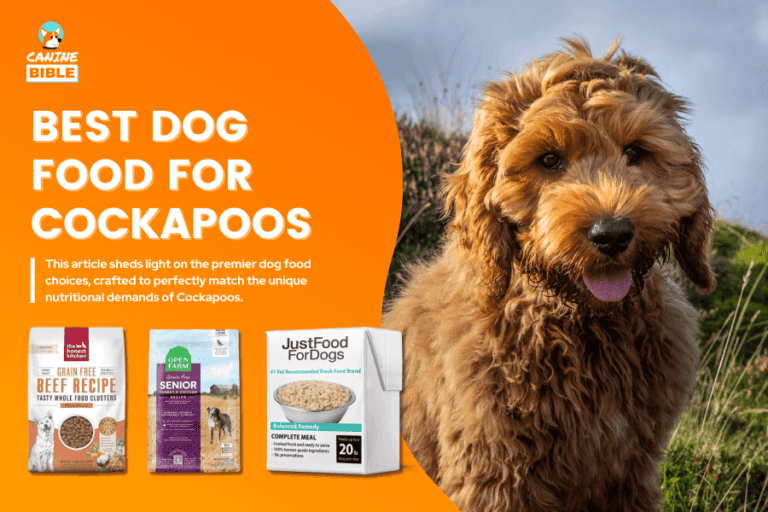Over The Counter Allergy Medicine For Dogs: Best & Safest OTC Options

Canine Bible is reader-supported. We receive affiliate commissions via some of our links. This doesn’t affect rankings. Learn more.
You know the feeling when your furry friend is sneezing, scratching, and itching all over, and you can’t help but wonder, “What’s the best over-the-counter allergy medicine for dogs?” The short answer to your burning question is that the best over-the-counter allergy medicine for dogs targets the specific cause of your pup’s allergy symptoms.
There are various types of over-the-counter (OTC) medicine for canine allergy relief, from antihistamines to relief wipes and everything in between. Today we explain each type to help you understand which option may be best for your pup’s specific allergy needs. Let’s get started!
Best Over The Counter Allergy Medicine For Dogs — At A Glance
Scroll to the right to see all our recommendations for the best over-the-counter allergy medicine.
What Are Over-The-Counter Allergy Medicine For Dogs?
Over-the-counter (OTC) allergy medicines for dogs are medications that can be purchased without a prescription from a veterinarian. They are designed to help alleviate or reduce allergy symptoms in our canine companions. These medications typically target the immune system’s response to allergens, minimizing inflammation, itching, and other allergy discomforts.
Over-The-Counter Dog Allergy Medicine Benefits
Over-the-counter (OTC) allergy medicines for dogs can provide several benefits when used appropriately and under the guidance of a veterinarian. Some of the advantages include:
Over-The-Counter Dog Allergy Medication Risks
Some risks and side effects of using OTC allergy medicine for dogs include:
Always consult your veterinarian before administering any OTC allergy medicine to your dog to ensure it’s appropriate and safe.
Best Over-The-Counter Allergy Medicine For Dogs
Are you looking for the best non-prescription allergy medicine for dogs? If you are concerned about giving your dog allergy prescription drugs, there are safe and effective over-the-counter treatments to help prevent or treat mild canine allergies.
These are the best over-the-counter allergy medicine for dogs.
1. Over-The-Counter Antihistamine For Dogs
Antihistamine for dogs is one of the most popular OTC allergy meds. There are a few options available. However, it’s always best to consult with your veterinarian before giving your dog any medication, including antihistamines, to ensure it is safe and appropriate for your specific pet. There may be other factors to consider, such as your dog’s overall health and any other medications they are taking,
Some common over-the-counter antihistamines that may be safe for dogs include diphenhydramine (Benadryl), loratadine (Claritin), and cetirizine (Zyrtec). These medications can help alleviate dogs’ itching, sneezing, and other allergy symptoms. Read our antihistamine for dogs guide to learn about the benefits, risks, and the best brands.
2. Over-The-Counter Corticosteroids

Over-the-counter corticosteroid creams and lotions can help reduce inflammation and itching in dogs with allergies to specific body parts. However, it is essential to consult your veterinarian before using these products, as long-term use can lead to potential side effects.
ZYMOX Veterinarian Topical Cream cream for dogs provides relief. It helps manage itchy allergy skin and other skin conditions common in pets, including cuts, wounds, hot spots, eczema, and pyodermas, and itchy allergy skin can affect their faces, body, paws, and skin folds.
It contains 1% Hydrocortisone, a common steroid (corticosteroid) medicine used in many prescription dog allergy meds. Hydrocortisone calms your body’s immune response, reducing pain, itching, and swelling (inflammation). They also offer a healing skin cream without Hydrocortisone for pets sensitive to corticosteroids, such as pregnant or lactating females, rabbits, and exotics. DOGSWELL Remedy is another great option to soothe skin, reduce inflammation or swelling and relieve itching. It contains 0.5% hydrocortisone.
Both products are made with no harsh chemicals and safe ingredients if licked after application, but a dog collar is recommended.
3. Over-The-Counter Dog CBD Oil For Allergies
CBD oil for dogs is used in dogs because of its anti-inflammatory properties and other incredible benefits such as reducing anxiety, arthritis, chronic pain, improving health, and many other dog health issues, said Dr. Jerry Klein, the Chief Veterinary Officer of American Kennel Club (AKC).
A study indicated that the endocannabinoid system (ECS) might target immune-mediated and inflammatory disorders such as allergic skin diseases and atopic dermatitis (an itchy skin disease in dogs).[1] Further research showed that hemp seed oil increased essential fatty acids in the skin and relieved atopic dermatitis symptoms.[2] In fact, another study found that ECS plays a crucial role in maintaining skin “homeostasis,” or the balance of skin cells and their proliferation, survival, and more.[3]
Aside from helping with allergies and relieving skin inflammation, CBD can help promote healing through healthy sleep patterns and calmness. Unlike shampoos or medications, these benefits are delivered without harsh chemicals or potential side effects.
4. Over-The-Counter Dog Allergy Supplements

Dog allergy supplements exist. Here are some of the best options. Pet Honesty offers excellent, all-natural daily supplements for dogs. They all contain natural ingredients like colostrum, turmeric, salmon oil, and probiotics to address allergies and digestion effectively without GMOs, preservatives, or common dietary allergens. Their top options include Allergy Support soft chews, Allergy SkinHealth soft chews, and Senior Allergy Support.
Another top-rated alternative is Zesty Paws Aller-Immunity Bites. These delicious grain-free soft chews contain EpiCor fiber, fish oil (with omega-3 fatty acids), colostrum, astragalus root, probiotics, apple cider vinegar, and other immune-boosting ingredients. Dog parents report that Vet’s Best Seasonal Allergy Relief has worked to relieve their dogs’ allergies.
There is a reason why many of the OTC dog allergy supplements mentioned above contain bovine colostrum it’s because it reduces itchiness and allergies in dogs. Colostrum, a type of pre-milk produced by mammals, contains antibodies and compounds that help reduce inflammation and overactive immune response. This is one of the highly-rated colostrum for dog supplements out there.
5. Over-The-Counter Omega 3 For Dogs With Allergies

Does fish oil help dogs with allergies? The nutrients in fish oil include omega-3 fatty acids such as eicosapentaenoic acid (EPA) and docosahexaenoic acid (DHA). DHA and EPA are anti-inflammatory agents and can be used to treat various inflammatory conditions like allergies (atopy). Recent research shows fatty acids have anti-inflammatory effects in animals.[4]
Nordic Naturals Omega-3 Pet Oil supplement is one of the best fish oil for dogs with allergies. All their omega-3 fish oils come in the triglyceride molecular form (naturally found in fish) for optimal absorption. Another great option is Zesty Paws Wild Alaskan Salmon Oil for dogs. For pet parents looking for an alternative to oil, you can also give capsules as Omega-3 fish oil chews. Fish oil can help with canine allergies and improve a dog’s skin and coat, which allows skin cells to maintain a strong barrier against allergens. It also promotes a healthier heart, joints and could lower cancer risk.
6. Over-The-Counter Probiotics For Dog Allergies
Dogs who consume probiotics are less likely to suffer allergies like digestive issues, itching, and scratching.
Gut and digestive health are essential. Unhealthy or inflamed intestines with abnormal gut bacteria can contribute to allergies. Dog probiotic supplements fight off the bad bacteria and restore the balance of “good” and “bad” bacteria in your dog’s body, effectively combating potential allergies.
Research evidence demonstrates the potential of probiotics for dogs with allergies. One study showed that puppies exposed to probiotics (from 3 weeks to 6 months) had significantly lower allergen-specific IgE (Immunoglobulin E) when house dust mites. In other words, the puppies that consumed probiotics had a milder reaction to allergens than puppies not exposed to probiotics.
The same puppies were followed up three years after the discontinuation of Lactobacillus Rhamnosus GG (LGG). LGG is a common probiotic strain in probiotics supplements. When the pups were re-exposed to house mites, results showed that the clinical scores after exposure to the allergen were higher (more severe) in the non-probiotic exposed litter. The study showed that early exposure to probiotics has long-term clinical and immunological effects, significantly decreases allergies, and prevents Atopic Dermatitis in canines.[5][6]
We recommend NomNom Probiotic Support which contains seven probiotic strains that can keep allergies at bay and combat diarrhea, loose stool, improve gut health, bad breath, constipation, digestive issues, and more.
7. Over-The-Counter Topical Allergy Medicine For Dogs

You’ll find many over-the-counter products for topical allergy relief for dogs. Topical options are applied directly to a part of the body that’s been affected. Here are some of the most effective choices.
Dogs suffering from skin conditions caused by foreign guests can use Pet MD Hydrocortisone Spray for Dog treatment. This product contains Hydrocortisone and other anti-inflammatory ingredients to nourish and soothe skin irritations. It can relieve itchy and inflamed skin due to allergies, hot spots, skin infections, and more. It’s non-toxic, and parents report it helps with allergies. Veterinary strength medicated formula made in the USA is federally regulated.
Alternatively, you can try the Skin Soother balm from the Natural Dog Company for treating hot spots, rashes, cuts, burns, surgical wounds, mange, and other skin issues. It’s made with soothing ingredients like lavender, chamomile, cocoa butter, and vitamin E that help to reduce itchiness, swelling, dandruff, and redness caused by seasonal allergies. This anti-inflammatory dog skin irritation treatment is formulated to prevent and treat many skin irritations.
8. Over-The-Counter Dog Allergy Shampoo

If your pup has skin allergies or seasonal allergies, washing allergens off your dog is very helpful in preventing itching, especially if they go outside and roll in the grass. Bathing your dog periodically with an ich relief dog shampoo like Vet’s Best Allergy Itch Relief Dog Shampoo can often remove allergens without drying out your dog’s skin. It’s a veterinarian-formulated blend of essential oils and key natural ingredients (oatmeal, D-limonene, and tea tree oil) to calm down and moisturize itchy red skin.
You could also try using a shampoo designed to reduce itching, such as Nootie Medicated Anti-Itch Dog Shampoo. Veterinary shampoos and conditioners like Virbac Epi-Soothe Shampoo are also formulated to reduce itching and dryness quickly. PetHonesty offers an Allergy Itch Relief Shampoo that contains chlorhexidine and ketoconazole to ease skin itching and improve skin inflammation, rashes, hot spots, skin infections, and wounds.
Pro tip: Rinse the shampoo with cool water when bathing a dog for allergies. Hot water can dry their skin and make the itching worse.
9. Over-The-Counter Allergy Relief Dog Wipes

You can also wipe your dog with allergy wipes, like TropiClean Oxy Med Allergy Relief Wipes or Curaseb Hydrocortisone Wipes for dogs. Dog wipes are useful for messy parks, beaches, or hiking trail adventures. Take wipes with you wherever you go for a quick clean-up and stop allergens on their tracks from damaging your dog’s coat and skin.
They can help with itching, dandruff, seborrhea, and hot spots. No water or rinsing is required, and it’s safe when used as directed on the pet’s face, ears, paws, tail, and body and on pets grooming themselves. Hydrocortisone, aloe, tea tree oil, oatmeal, chamomile, or another ingredient that soothes skin irritation and itch is typically found in these products.
10. Over-The-Counter Quercetin Dog Allergy

Does Quercetin help with dog allergies? Quercetin is a flavonoid (a bioflavonoid) with anti-oxidant, anti-histamine, and anti-inflammatory properties.
Studies have shown that Quercetin suppresses or moderates inflammation by reducing histamine production. As a result, it has been dubbed “Nature’s Benadryl.” Animal studies showed that Quercetin helps combat allergy and associated asthma and inflammation-related respiratory issues.[7]
Anecdotal evidence from dog parents also reports it as a healthy alternative for dogs with allergies. We like Amazing Nutrition’s Quercetin Bromelain supplement. Quercetin suppresses histamine response (which causes allergic reactions), while Bromelain works on an enzyme and protein level, limiting the action of metabolites and neutrophils on inflammation. It may help reduce joint pain, and swelling caused due to inflammation as well. Quercetin dog treats are also another option.
Quercetin may help fight against free radicals, promoting cell health and healthy aging. Quercetin isn’t meant to be taken long-term, and you should consult your vet if you plan to use this supplement—on your dog.
Over The Counter Allergy Medicine For Dogs — Conclusion
Finding the best over-the-counter allergy medicine for dogs can be a game-changer for your dog’s well-being. With the information provided in this article, you’ll be well-equipped to navigate the options available and make an informed decision to help your pup enjoy a life free from the discomforts of allergies. Always consult your veterinarian for guidance on choosing the proper medication and dosage for your dog’s needs.
While OTC medication can effectively treat dogs’ mild to moderate allergy symptoms, it may not be sufficient for severe cases or chronic conditions. In such cases, a veterinarian may prescribe other treatments, such as corticosteroids or immunotherapy, depending on the underlying cause of the allergy.
Like It? Subscribe & Share!
Canine Bible authorship represents the unified voice of our entire editorial team and our in-house veterinarians rather than a single author. Each article, blog post, and review published under the Canine Bible name undergoes a rigorous review process, involving all team members to guarantee accuracy and up-to-date in accordance with the latest veterinarian research. This collaborative effort is an integral part of our editorial process and aligns with our four pillars of content creation. This approach ensures our content is backed by expert knowledge and factual information, offering our readers reliable, actionable, and trustworthy content.










![10 Best Dog Food For Dogue de Bordeaux [Breed-Specific Picks]](https://www.caninebible.com/wp-content/uploads/2023/06/best-dog-food-for-Dogues-de-Bordeaux-1-768x512.png)
![Nom Nom Dog Food Reviews: My Dogs’ Verdict [Cost, Puppies, Cons, Price & More]](https://www.caninebible.com/wp-content/uploads/2022/12/nom-nom-dog-food-reviews-768x512.png)



